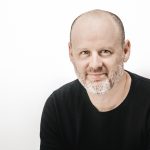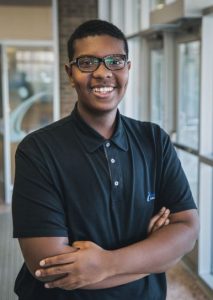“There are things we have to understand in our hearts before we can do other things with our minds. Our hearts have to be at peace.”
Related pages
Skyler Charlot first left his native Haiti at the age of 3, when his family moved to the United States. In November 2018, to escape the many restrictions related to his immigration status, he followed his father to Canada. For Skyler, this change came with a lot of deep emotions, which he feels tend to be underestimated by the adults in charge of welcoming young people like him into Québec society. As he says himself :
“you have to remember that every young person has two stories: the one they show on their face, and the one they experience inside…”
Skyler, what were the circumstances of your coming in Montreal?
It’s a long story. When I was 3, my family left Haiti to live in Florida. My parents split up, and my father emigrated to Canada. Three years ago, he told me, “Skyler, you’re starting to get old enough to make your own decisions. So I’ll give you two years to decide whether you want to come live with me in Canada or stay with your mother in Florida.” At the same time, he was telling me all about how good life was here, and I was doing a lot of research on Canada, its language, and so on. I figured I’d have more privileges here than in the U.S., especially since Donald Trump came to power, because he changed a lot of rules. I was convinced that in Canada, if I was in a good community, I could live my life without any serious problems and in safety.
What kind of privileges do you mean?
For example, in Florida, because of my immigration status, I couldn’t even travel out of state. I could never have even voted. Here, it only took eight months to become a Canadian citizen. In the U.S., it’s very complicated to apply for citizenship. Another example: one day, I broke my foot and had to go to the hospital. My mother, who doesn’t have a partner or insurance, had to spend $12,000 for the treatment. My little brother, who was born in the States, has more privileges then my mother and me, because we were born in Haiti.
Now I can understand why you decided to follow your father to Montreal. How was it to leave?
One day after school, my father came to pick me up and told me, “Come on, we’re going to the airport. Today, you’re leaving Florida to live with me in Canada.” I was sad because I didn’t have time to do anything. No farewell party, nothing.
We left for Haiti that day, where we spent two weeks to get our documents together. Then we arrived here on November 21, 2018. So it’s been a year.
It was a really tough decision for me because I was used to living with my mother and two brothers in Florida. I try to talk to them almost every day on FaceTime, and it puts a smile on my face. Even if it was really hard to not be there for birthdays and Christmas.
Does that make you regret leaving?
Yes and no. Of course, I left behind my family, my friends, my old life in the States, and I have to get used to a lot of new things like the weather, the language, and a new school. But I’m still convinced I made the right decision.
Describe your first contact with your new country.
It was such a shock that I was speechless. My heart was beating so fast, I was super excited. The only words running through my head were, I am free!
I arrived at night, and it was snowing. Obviously, that was the first time I had ever seen snow. I knew it existed because I’d seen it in films, but to feel it on my face was really strange. The cold didn’t bother me; I think I still had Florida’s heat in my body.
And how were those first days and weeks?
Every morning brought with it something different. My father and step-mother are foster parents, so I was living with four other children in the house. I was really surprised how they spoke to my father. They were really respectful. And everyone had their responsibilities and chores.
The other big shock came at Calixa-Lavallée school. It was so… international! There were white kids, Latinos, Arabs, Haitians, Congolese. Wow! And everyone spoke French, everyone was so welcoming. They’d say, “Hi, how are you?” I wasn’t used to that; it was a bit of a shock too.
What was the hardest part?
Speaking and learning French. Right on the first day, the teacher said, “Everyone is going to introduce themselves in French.” I stood up but I didn’t say anything; I couldn’t speak. The other students helped me say Je m’appelle Skyler. I’m always the first person to talk in any group, and I found it hard to not be able to express myself. Luckily, I could speak Creole, and that helped me learn French.
But Quebecois expressions make me laugh. My teacher, Mr. Guillaume, teaches me a new expression every time I see him. Dormir au gaz [sleep at the switch], Changer quatre trente sous pour une piasse [literally: exchanging four quarters for a buck, i.e., making a pointless change]. At first, I had no idea what that meant.
I imagine it’s not all hard when you arrive in a new country and at a new school. What have you liked most of all?
You’ll probably laugh, but I have tasted almost every type of food since I’ve arrived. I’m a foodie, and I love finding out new things about cultures, so I’ve been spoiled that way.
Have you given any thought about what kind of job you’d like to do later?
I have four! You need to have back-ups in life, so I have a plan A, B, C, and D. My plan A is to teach French.
Before, I wanted to be a doctor. In Florida, I had been in a special program for kids who want to become doctors since I was 9 years old, and we often went to the hospital to help people. But I realized that I don’t really like it very much.
I like communicating, I like talking to people. I have a lot of curiosity, so I could be a journalist.
If you had one piece of advice to give to the adults who take care of young immigrants like you, what would you say?
First, adults have to understand just how big of a shock it is for us. There are things we have to understand in our hearts before we can do other things with our minds. Our hearts have to be at peace. And we have to feel safe too.
Adults can’t always imagine what we’re going through either. For example, some kids are bullied, but it never shows on their faces. They might smile in class but have really complicated problems at home. You have to remember that every young person has two stories: the one they show on their face, and the one they experience inside… And to those kids, I would say, “you are capable of overcoming your challenges. “Yes, you can.”
Just be you.
Skyler Charlot
November 2019
 Photo and interview : François Couture
Photo and interview : François Couture
To better understand their unique circumstances, we asked writer and photographer François Couture to meet with young immigrants who were willing to talk about their backgrounds, their experience, and their arrival in Montreal.




